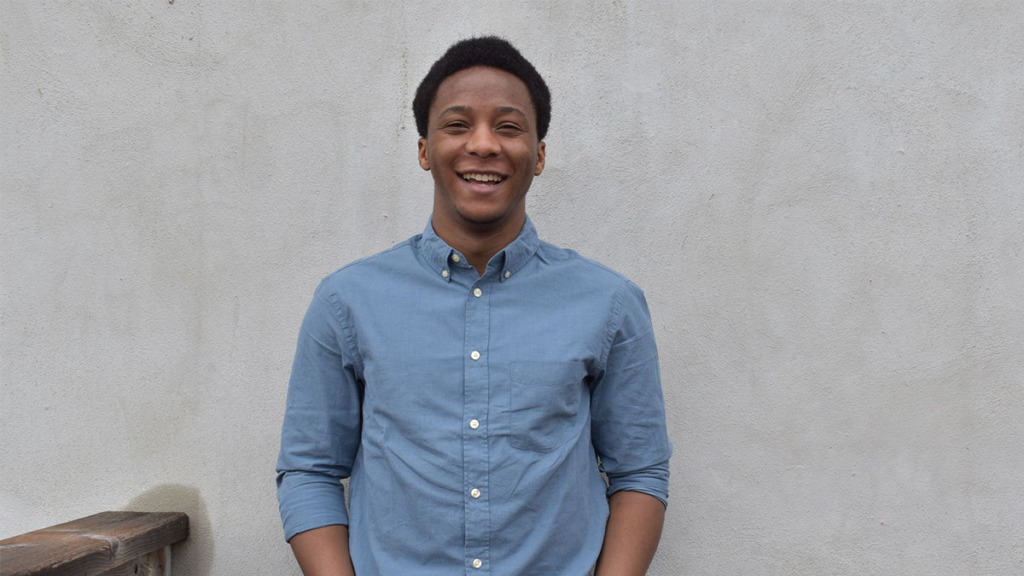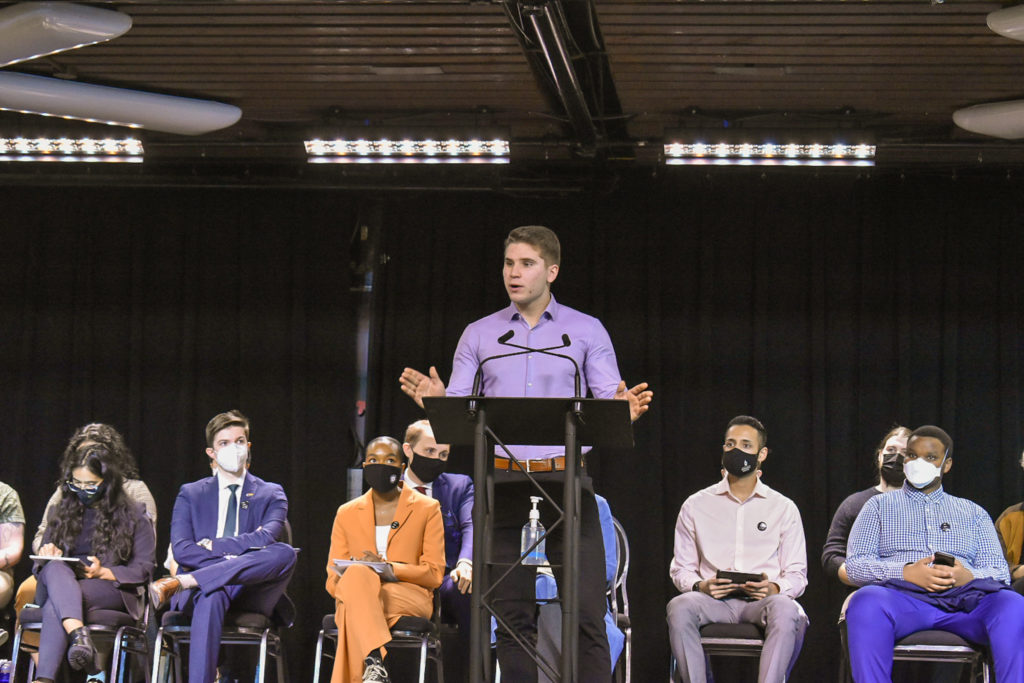 Rosty Soroka
Rosty SorokaStudents have a lot on their minds right now — budget cuts to post-secondary education, tuition increases, and the risks of COVID-19 looming over their heads. All of this under a provincial government who has shown time and time again that students are not their priority.
Unfortunately, there is no direct line between the provincial government and post-secondary students. Instead, students have to rely on advocates to do the heavy lifting on our behalf.
All we’ve had over the past three years is the knowledge that eventually, conditions might improve for students. Students count on representation and advocacy to bring adequate change, and to tell the provincial government exactly what students think. Lately, however, this hasn’t been the case.
For undergraduate students at the University of Alberta, external advocacy falls primarily to Christian Fotang, vice-president (external), and Alex Dorscheid, Board of Governors representative.
Whether in advocacy or politics, students have a right to be adequately represented. If non-partisan advocacy isn’t possible, then students have a right to know.
On September 12, Rebecca Schulz, a conservative MLA in Calgary, tweeted pictures of an event she had attended, hosted by the University of Alberta’s Conservatives club. Among those pictured at the event were Dorscheid and Fotang.
In her tweet, Schulz very clearly identified everyone sitting in that room as “young, engaged conservatives.” Fotang and Dorscheid were not exempt from this label, even if they wished to be non-partisan. To Schulz, they obviously seemed like supporters. To those who saw the tweet, and recognized them, the message was clear. Dorscheid and Fotang appeared to be supporting a party who had made merciless cuts to post-secondary education, the very party they are meant to advocate on students’ behalf to.
This isn’t the first time student representatives have gotten in hot water for smiling in photo-ops with the provincial government that slashed our budget. Even if there for advocacy, students don’t appreciate seeing their elected representatives rubbing elbows with the United Conservative Party (UCP) in a friendly way.
Obviously, people are entitled to their beliefs. But, when you’re in a position of power, the dynamic changes. Any beliefs Dorscheid and Fotang hold must stay separate from any work they do as representatives.
On September 21, I interviewed both Fotang and Dorscheid to better understand the advocacy work they do, as well as why they attended the event, prior to the UCP leadership announcement. Fotang said Schulz had the potential to be premier, which “would have a huge say and sway in our sector.”
“And if the opportunity arises [with] any other candidate to be able to meet with them, we will do the same,” Fotang said.

Dorscheid answered that he attended the event to discuss what the UCP thought of leadership at the U of A.
“They’re quite respectable and they’re happy with the leadership of U of A and the way they’ve dealt with the budget cuts. So they felt pretty happy with the direction the institution is going overall.”
In their interviews, both Dorscheid and Fotang said that their roles are strictly non-partisan. When they went to this event, they were there on behalf of students to voice concerns to Schulz, a current MLA and, at the time, prospective leader of the UCP.
In a time where students are struggling to afford their education and the rising cost of living, advocacy needs to focus on politicians who can actually help us. More than that, advocacy needs to be strong and direct. Meeting with an MLA from Calgary does not actively help students, especially when at the time, she did not have a strong chance of becoming premier.
I asked both Fotang and Dorscheid how they would respond to Schulz’s caption.
“I think it’s good to see that people on campus are attending events and involved in the political process, no matter what party you support, so I think it’s good that she’s happy to see that people are engaged on campus,” Dorscheid said.
In turn, Fotang answered that if the opportunity arises, he will meet with any elected official to talk about the issues currently facing students.
Student advocates need to be transparent to the people that voted for them. Many student representatives have political affiliations, especially with the New Democratic Party (NDP) or Liberal Party. But, lots of them are transparent about their beliefs. We need greater consistency with transparency across the board. At the very least, both Fotang and Dorscheid owe students honesty. So far, they haven’t been.
When I asked Fotang how he heard about the event, he told me that it was “done by invitation.” This is not true.
After interviewing Dorscheid and Fotang, I reached out to Ethan Lecavalier-Kidney, the current president of the University of Alberta’s Conservatives club, to talk to him about the event.
“We rarely have invite-only events. And if we were to have invite-only events, we wouldn’t have [been] posting them on our Instagram page,” he said.
In fact, when I asked Dorscheid how he heard about the event, he said he had seen posts about it on Instagram.
Furthermore, the club is geared towards conservatives, or those who are interested in conservatism. In order to be a member of the club, you also need to be a member of either the federal or provincial parties, according to Lecavalier-Kidney. However, even if you aren’t a member, you’re still allowed to attend their events.
“We don’t turn people away from attending our events, unless they’re causing an obvious disruption,” Lecavalier-Kidney said.
In our interview, I asked Dorscheid outright if he supports the UCP. He told me that he was in a non-partisan position, and his political beliefs don’t pertain to the role he has. This is true, but when his political beliefs are out in the open, it sways any advocacy he might do. On the club’s BearsDen page, Dorscheid is very clearly listed as a member, even though you can hide your membership, as 46 out of 79 chose to do.
Dorscheid can’t have it both ways — he can’t claim to be non-partisan in his advocacy, have his political biases out in the open, and then refuse to talk about it.

Additionally, both Fotang and Dorscheid follow various campus clubs on social media. At the time of this article, as far as partisan clubs go, both only follow the Conservatives club on Instagram.
In my interview with Fotang, I also asked him if he personally supported the UCP.
“I would just clarify by saying I don’t support the UCP. I am non-partisan in my role. So it’s part of my role to engage with all elected members, regardless of their parties.”
In all fairness, there are different levels of partisanship that Dorscheid and Fotang can participate in. As a paid executive of the Students’ Union, Fotang has significantly less freedom in how openly he can be with his opinions compared to Dorscheid. In fact, the Students’ Union clearly states that it is “imperative that the UASU is a non-partisan organization and is perceived as nonpartisan.”
The issue isn’t that Fotang and Dorscheid attended an event where Schulz spoke. It’s crucial to their advocacy that they meet with politicians. The problems began when they met with a conservative MLA for a completely different city, at an event that was advertised for conservative students — as a mixer-type event.
Lecavalier-Kidney told me it was intended to be a social event and networking opportunity for young conservatives.
“Well, the nice thing about having politicians as compared to professors is that being a politician is a very social job. So we’re fortunate in that regard that our guests do typically want to socialize with our membership, and not just present a lecture or give a speech,” he said.
In our interview, I asked Dorscheid if he advocated for students to Schulz when she spoke at the event.
“I didn’t have that long [of a] conversation with her to get into more of those nitty gritty details. But, it sounds like we flipped a page. There’s going to be nothing else coming in budget cuts to the university. So [it] kind of sounds like things are looking positive for the future.”
First of all, there’s no real point in advocating to Schulz about the impacts of budget cuts on students — in her current role, she has nothing to do with post-secondary education. Schulz may have some general knowledge about the UCP, but she isn’t a reliable source for insight into the direction of post-secondary education. And now, with the new UCP leadership, all bets are off.
While it is true that Schulz was a minister when the provincial government made immense budget cuts to post-secondary education, it wasn’t in her purview at all. At the time, she was the Minister of Children’s Services. Now, under Danielle Smith, Schulz is the Minister of Municipal Affairs.
So, in exchange for a couple minutes of conversation, Dorscheid and Fotang put themselves in a position to be labeled “young, engaged conservatives” to both the UCP and students.
Later, I asked Lecavalier-Kidney if executives often came to speaker events hosted by the club.
“I’ve seen senior executives at our meetings, but to say that they would be gung-ho participants, I don’t think would be an accurate representation. I think they’re frankly representing the Students’ Union and the student body well, with people who make very important decisions, specifically related to advanced education,” he said.
Fotang said that he would meet with any politician that came to speak on campus. In our interview, he said he has met with Blake Desjarlais, Heather McPherson, and Lori Sigurdson, to name a few.
At the end of our interview, I asked Fotang if he had any response to students who were concerned that his presence at this event makes him look like he supports the UCP.
“I would tell them what I’m telling you. Our job is to push for your concerns. And in that interaction with Miss Schulz, I told her exactly what I’m telling you: students are suffering, we’re seeing mental health crises on campus. And if she could potentially be the next premier, then it’s essential that we’re able to put our positions out there and build relationships with folks who will have a say in our sector.”
It’s a mighty big risk to meet with someone, in such a casual setting, just because they might be premier. In fact, this isn’t the first time Fotang has been criticized for his approach to advocacy. In his campaign, Fotang stressed advocating through avenues besides protesting in contrast to his opponent and was criticized for not organizing protests in the wake of budget cuts last year. It’s a bad look to not protest against a government that has deeply hurt your constituents, then go to their event and be labelled a supporter.
When asked the same question, Dorscheid responded that he is non-partisan, and students shouldn’t be troubled with this.
“I need to work with whatever provincial government is in charge. So, I think it’s very important for this role that I’m in attendance of these events. My attendance at these events does not constitute me being for or against one side.”
Students have a right to know if those representing them have any biases that could impede their advocacy. Our student representatives know students are suffering. Students shouldn’t have to worry that their representatives are being perceived as supporters to a particular party in their roles — especially when that party has shown it’s not on students’ side.
Students need advocacy more than ever. However, student representatives need to be intentional and transparent in the ways they advocate to politicians. Above all else, students deserve consistency.




